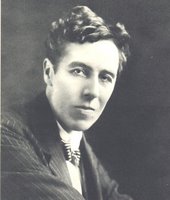 Ronald Firbank born 17 January 1886 (d. 1926)
Ronald Firbank born 17 January 1886 (d. 1926)Arthur Annesley Ronald Firbank was an eccentric and effete British novelist.
Ronald Firbank was born in London, the son of society lady Harriet Jane Garrett and MP Sir Thomas Firbank. He went to Uppingham School, and then on to Trinity Hall, Cambridge. He converted to Catholicism in 1907. In 1909 he left Cambridge, without completing a degree.
He published his first book, Odette d'Antrevernes, in 1905 before going up to Cambridge. From then, from The Artificial Princess (written in 1915, published posthumously in 1934) and Vainglory (1915, his longest work) to Concerning the Eccentricities of Cardinal Pirelli (1926, also posthumous) he produced a series of novels.
Inclinations (1916) takes place mainly in Greece, where 15-year-old Mabel Collins is travelling with her female chaperone, Miss O'Brookomore; Mabel elopes with an Italian conte, but the plot is of minor importance, the book's interest - as with all Firbank's work - lies in the dialogue. His next novel Caprice followed in 1917.
Valmouth (1918) is based on the activities of various people in a health resort on the West Coast of England; most of the inhabitants are centenarians, and some are improbably older. The plot, such as it is, is concerned with the attempts of two elderly ladies, Mrs Hurstpierpoint and Mrs Thoroughfare, to marry off the heir to Hare-Hatch House, Captain Dick Thoroughfare, who is engaged to a black woman, Niri-Esther, is loved frantically by Thetis Tooke, a farmer's daughter, but prefers his 'chum', Jack Whorwood, to both of them. Meanwhile Mrs Yajnavalkya, a black masseuse, manages an alliance between the centenarian Lady Parvula de Panzoust and David Tooke, Thetis's brother. A musical comedy by Sandy Wilson gave the novel some popularity in the 1960s. It has several times been revived and recorded on CD.
In The Flower Beneath The Foot (1923), the setting is an imaginary country which may be assumed to be somewhere in the Balkans. The characters include the King and Queen, sundry high-born ladies about the Court, and the usual attendant chorus of priests and nuns.
Sorrow in Sunlight, retitled at the suggestion of the publisher Prancing N*gger (1925) was especially successful in America. The scene is laid in an imagined West Indian republic. A black family, socially ambitious, move from their rural home to the capital, and the story is concerned with their attempts (which prove mainly abortive) to 'get into society'.
Concerning the Eccentricities of Cardinal Pirelli (1926) begins with the Cardinal christening a dog in his cathedral and ends with His Eminence dying of a heart attack while chasing, naked, a choirboy around the aisles.
Firbank's play The Princess Zoubaroff (1920) has been compared to William Congreve, but is rarely produced; Dame Edith Evans, perhaps the greatest English actress of her time, played the part in a radio production in 1964. The dialogue is highly characteristic: as, Princess Zoubaroff: 'I am always disappointed with mountains. There are no mountains in the world as high as I would wish...They irritate me invariably. I should like to shake Switzerland.'
His Complete Short Stories were published in a single volume in 1990 (ed. Steven Moore), and his Complete Plays in 1991 in a volume containing The Princess Zoubaroff.
He left among his manuscripts the first few characteristic chapters of a novel set in New York, The New Rythum [sic], published in 1962 after a sale of many of his manuscripts and letters.
Some critics have dismissed Firbank's novels as slight, but they have been championed by a large number of English novelists including E M Forster, Evelyn Waugh and Simon Raven. The poet W H Auden praised him highly in a radio broadcast on the BBC in 1961. Susan Sontag named his novels as constituting part of 'the canon of camp' in her 1964 essay 'Notes on "Camp"'. His writing style is sufficiently distinctive that the adjective 'Firbankian' was coined.
Living off his inheritance more than his writing, he travelled around Spain, Italy, the Middle East, and North Africa.
Ronald Firbank died of lung disease while in Rome in 1926.